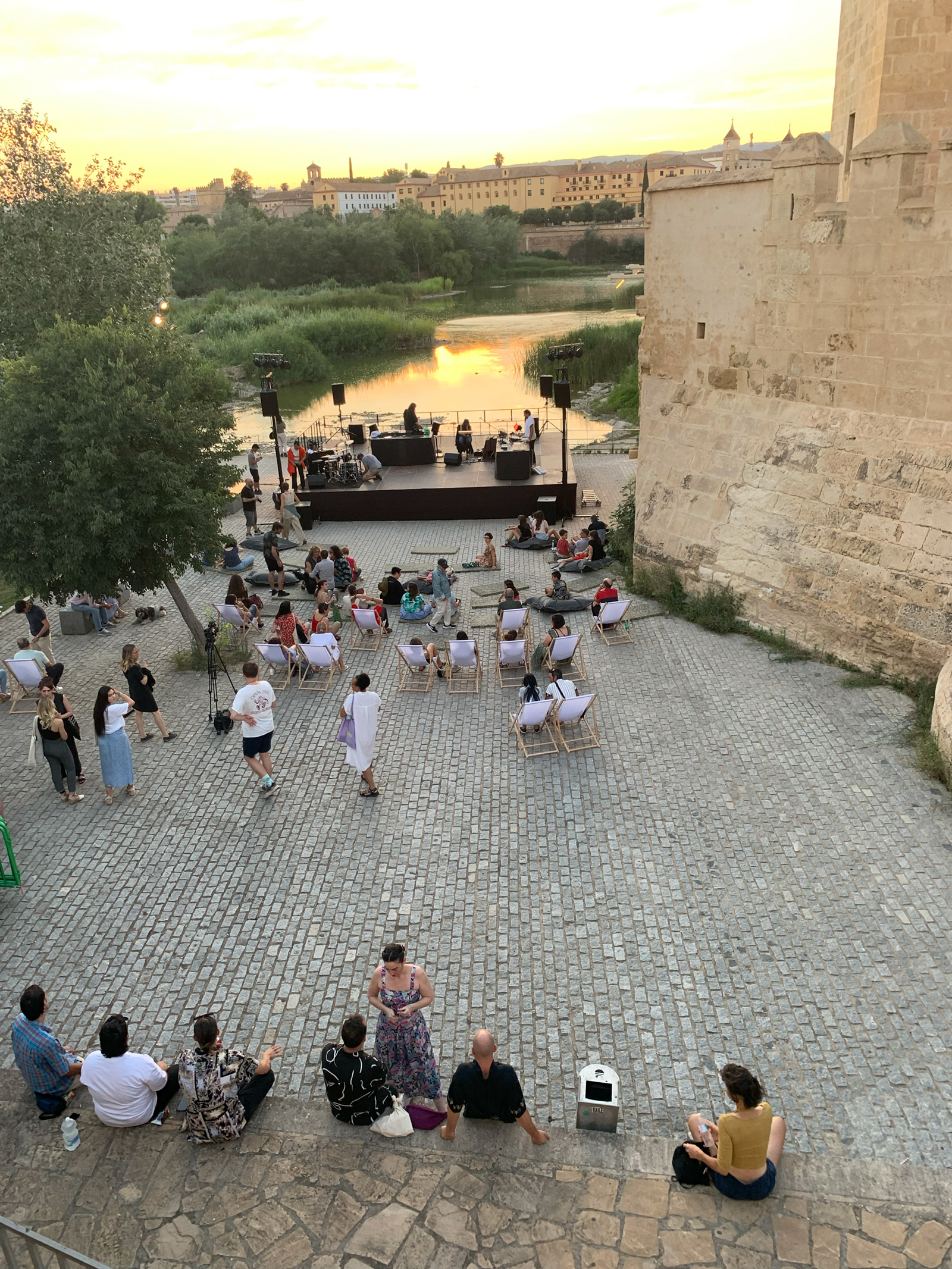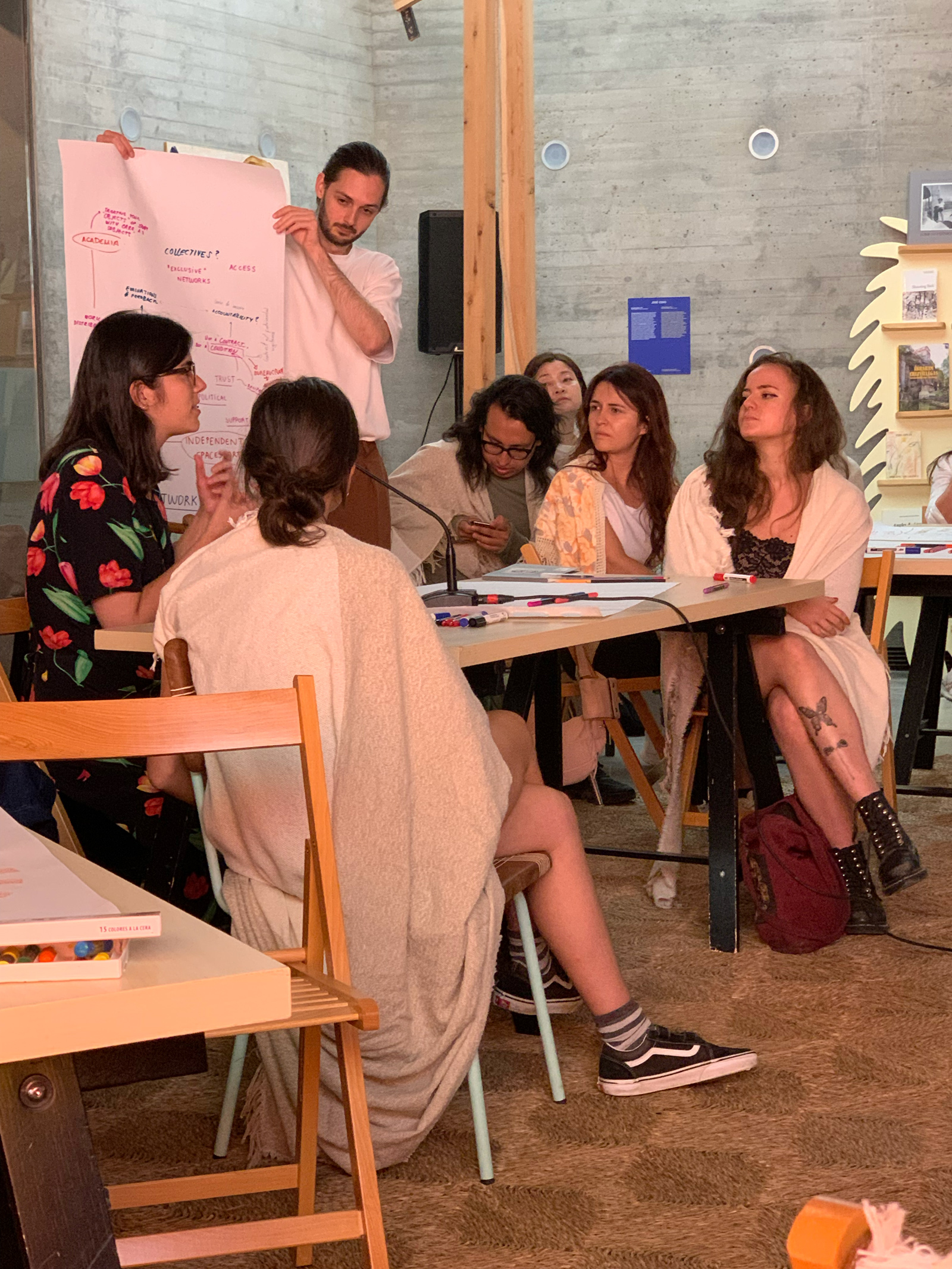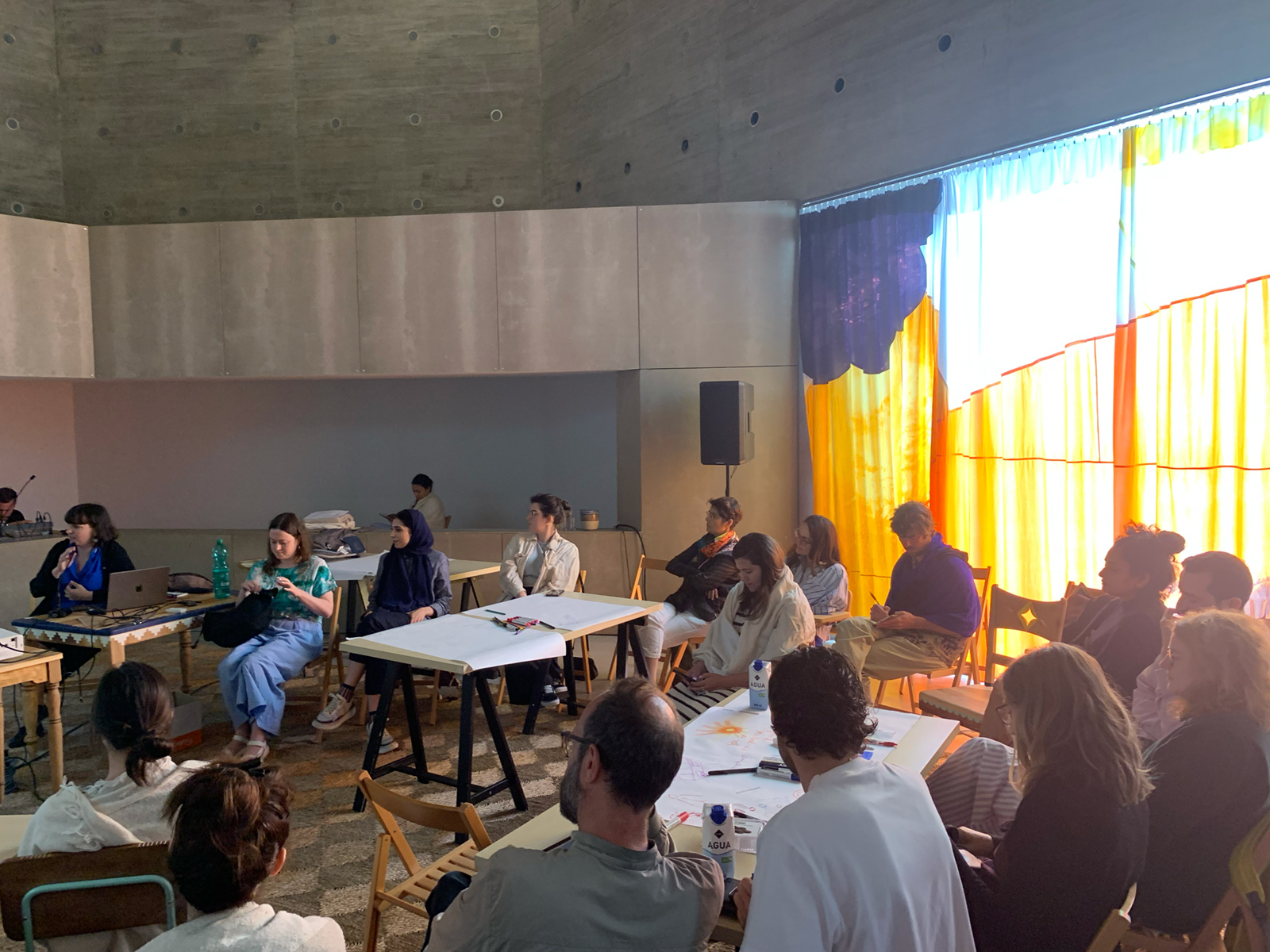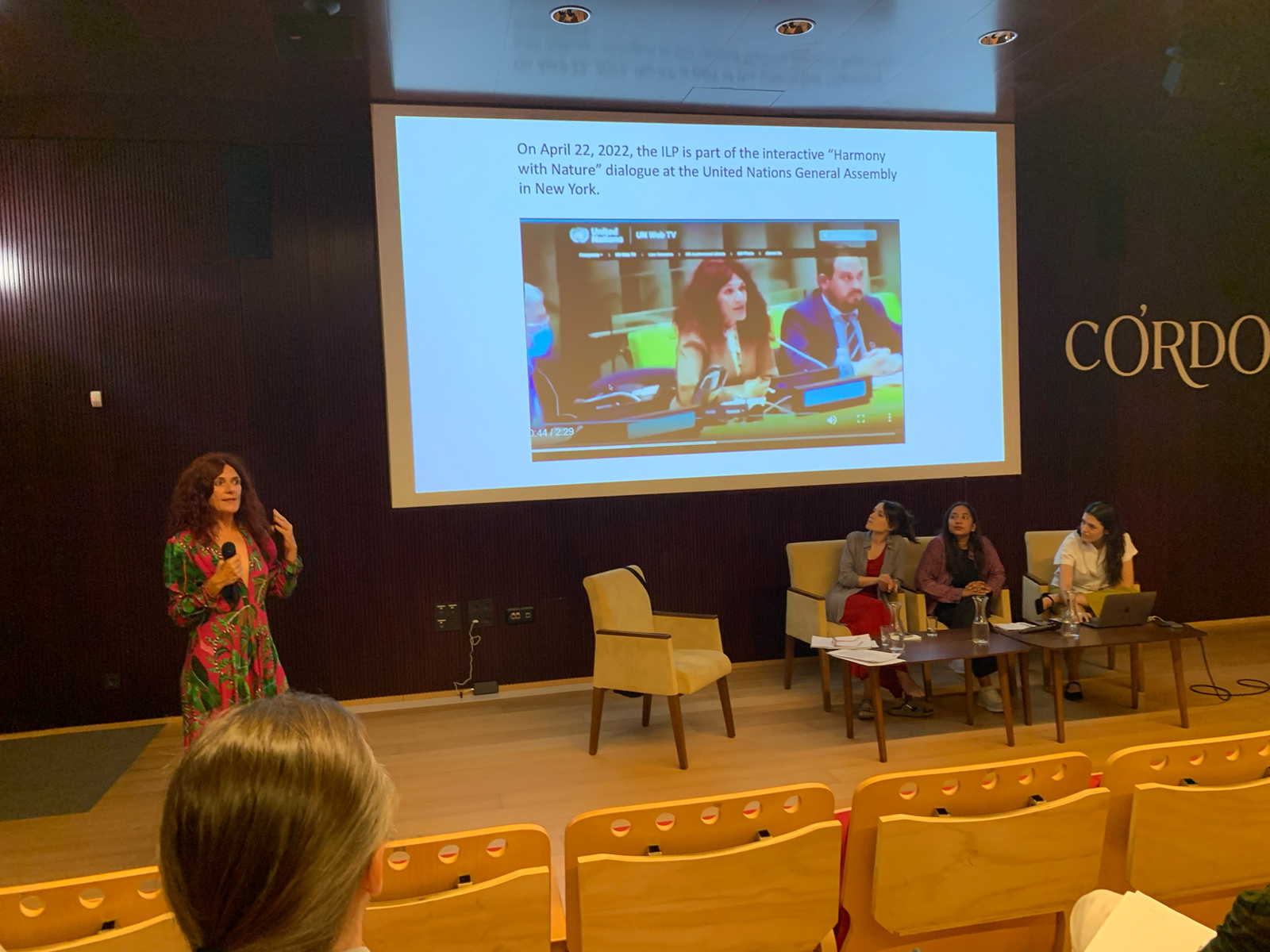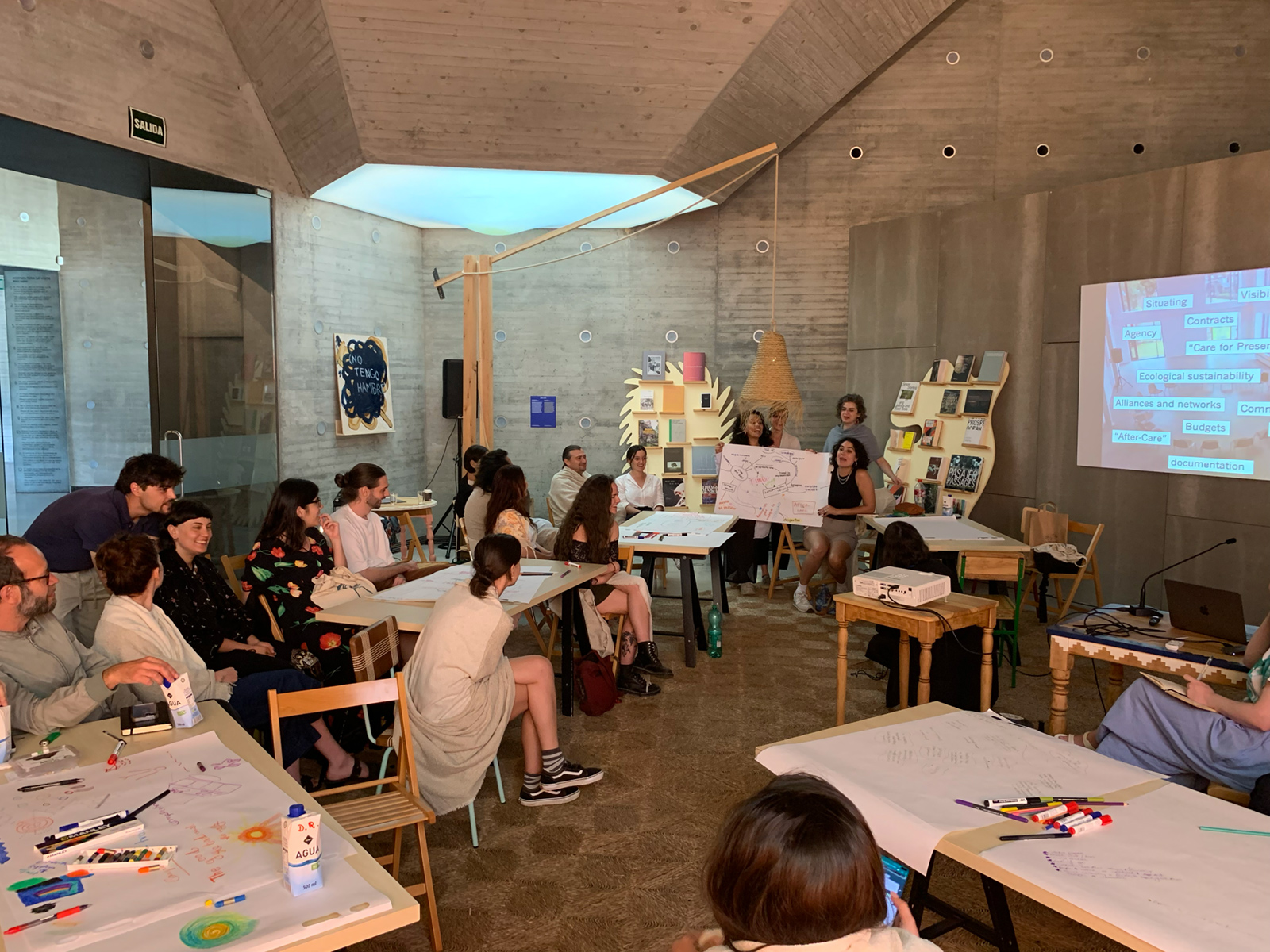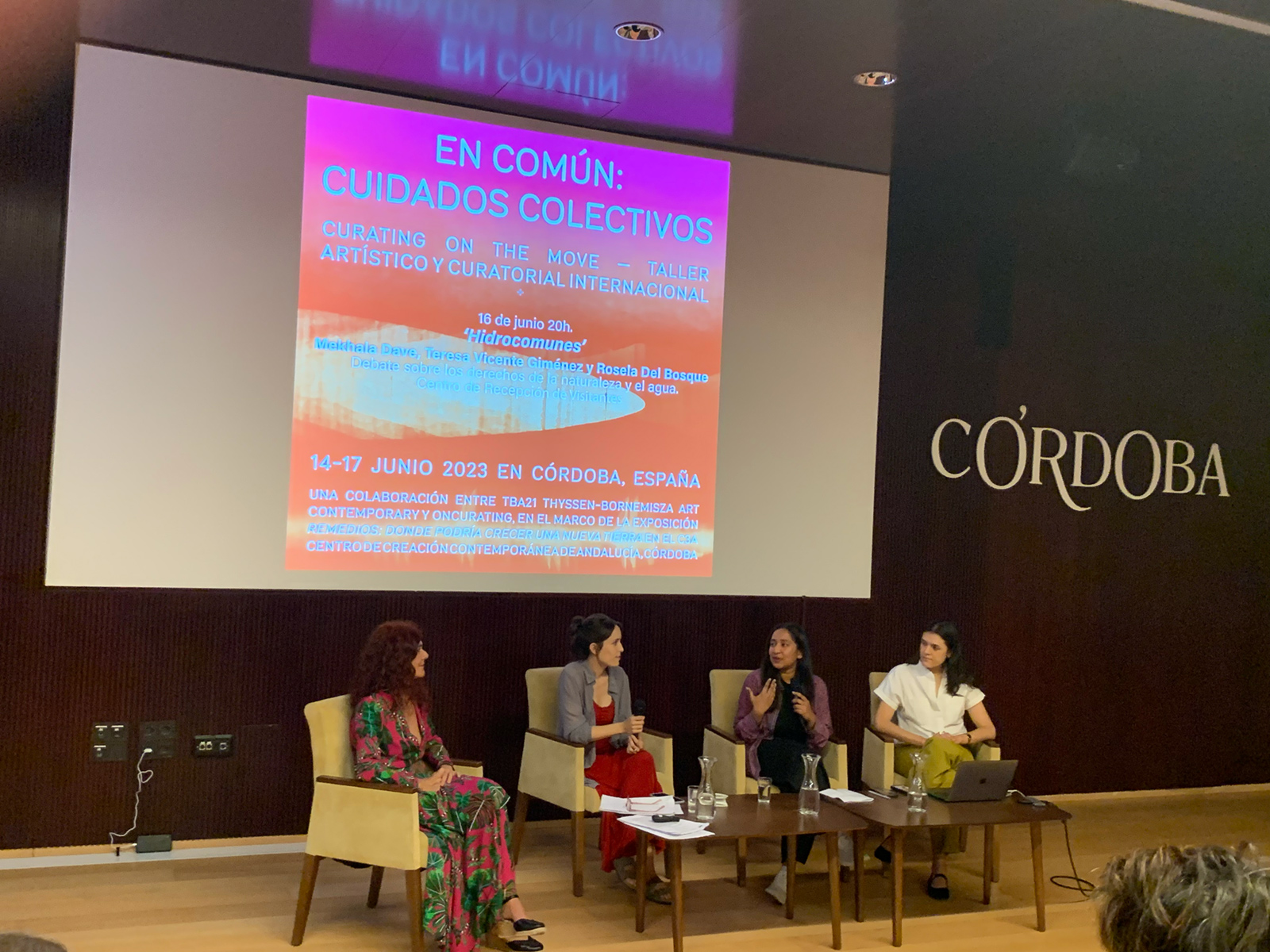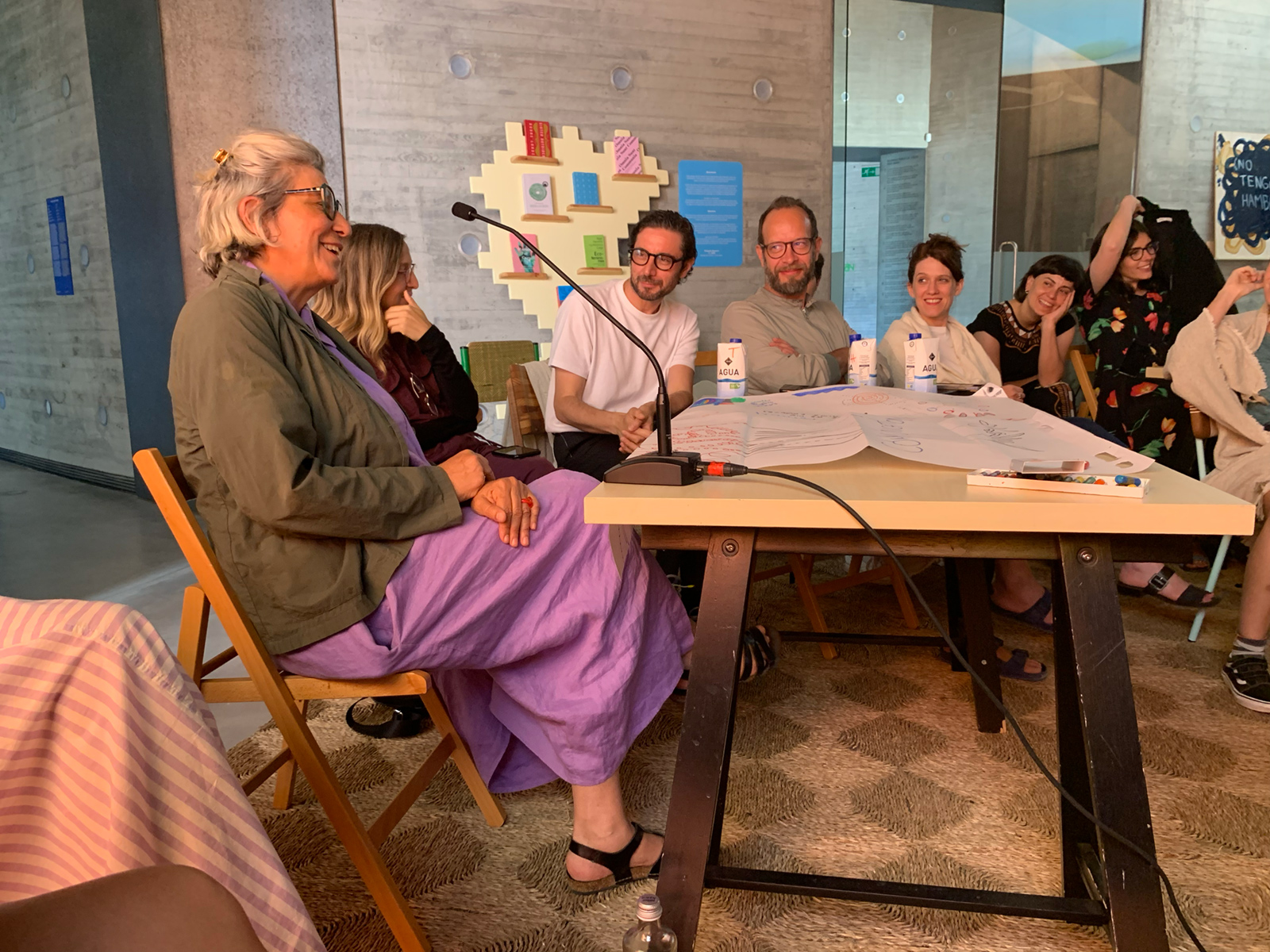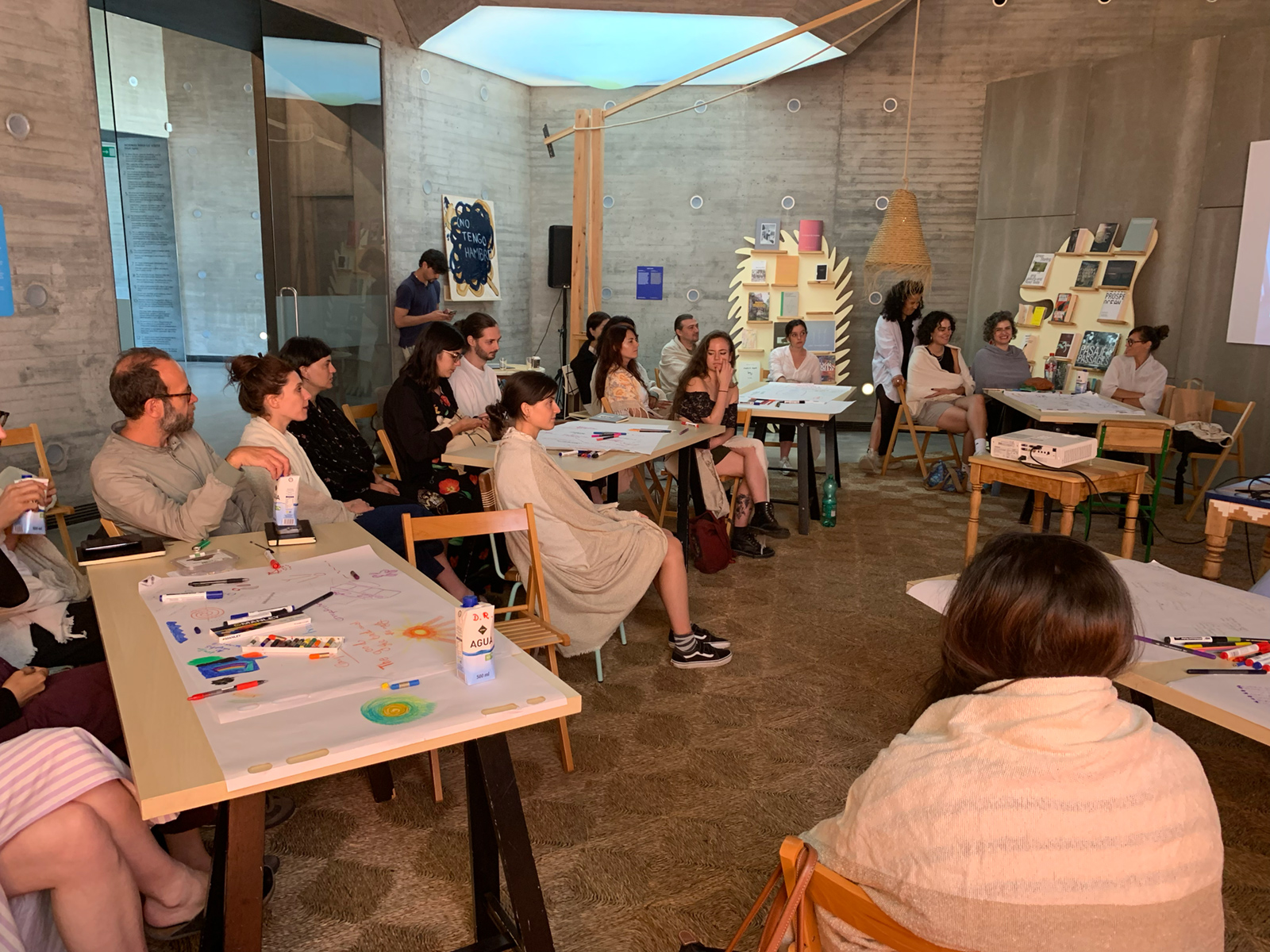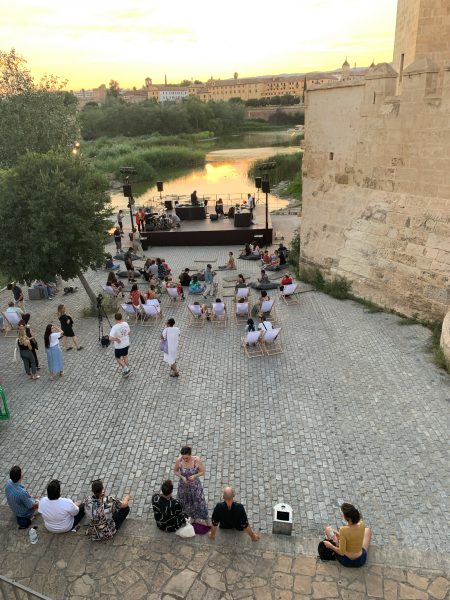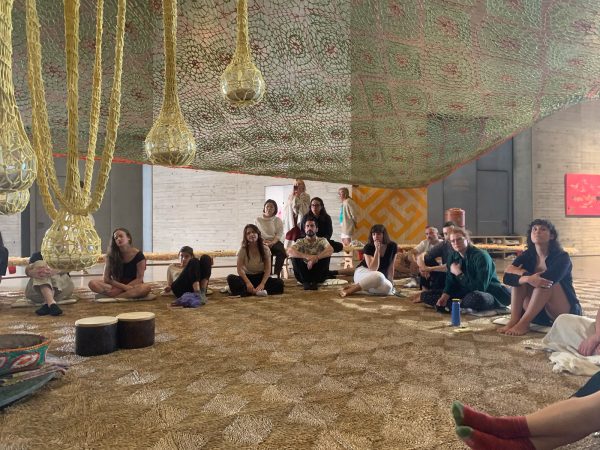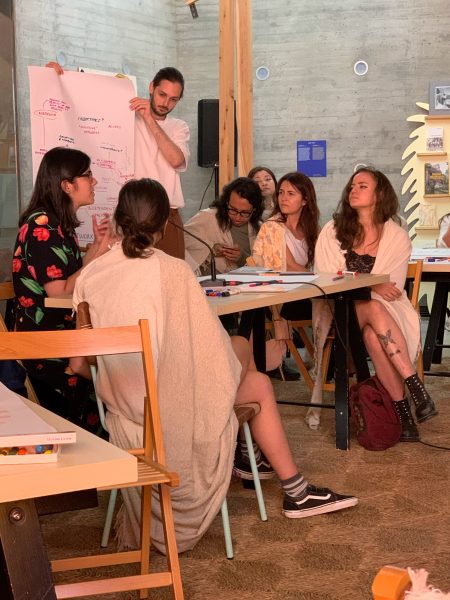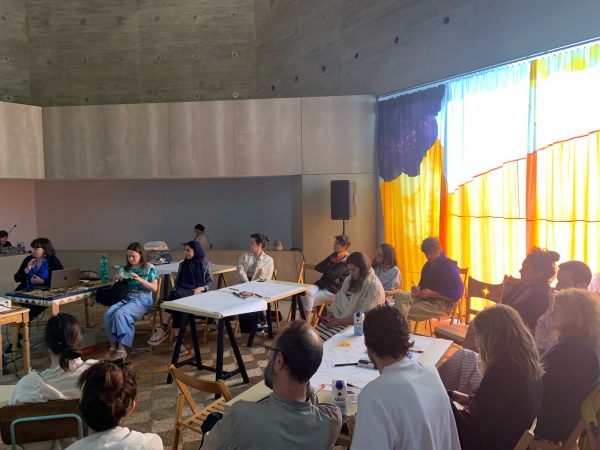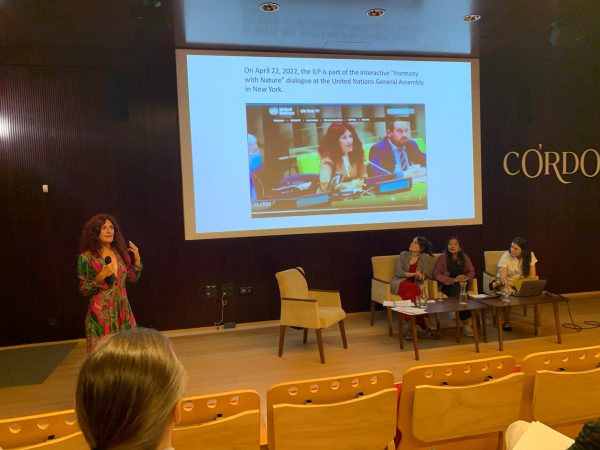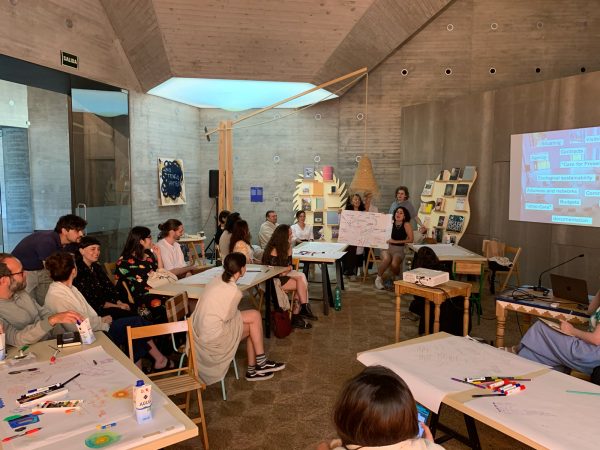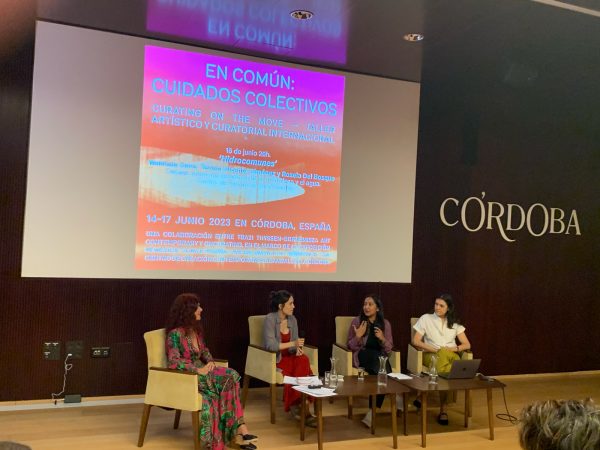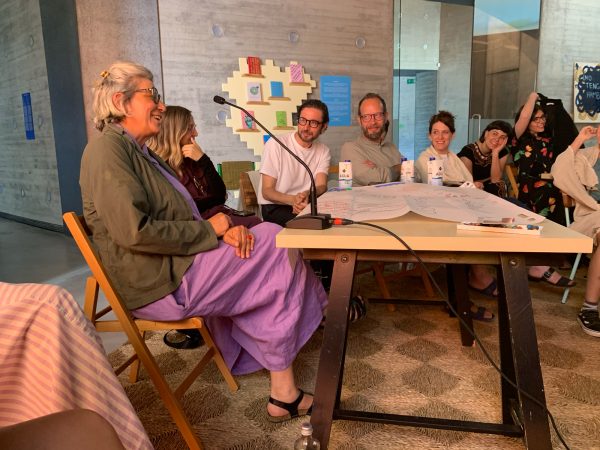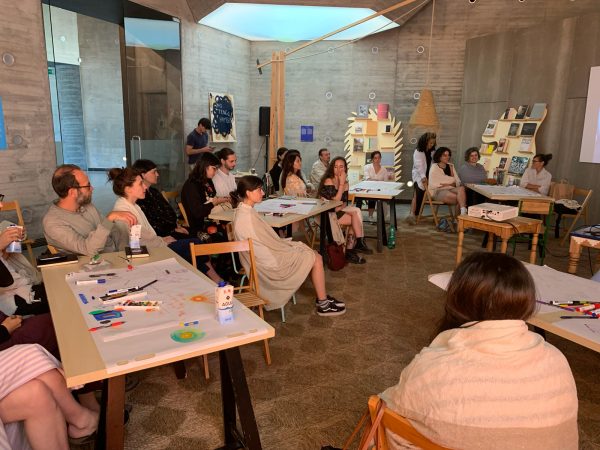Curating on the move
Commoning Collective Care
Curating on the Move—An international curatorial and artistic workshop
A collaboration between TBA21 Thyssen-Bornemisza Art Contemporary and OnCurating
June 14–17, 2023, Córdoba, Spain
C3A Centro de Creación Contemporánea de Andalucía, Córdoba
Commoning Collective Care is curated by Ronald Kolb, Dorothee Richter, and Daniela Zyman.
Public program and workshops:
https://tba21.org/CommoningCollectiveCare
Workshop: 15–17 June 2023, 11am – 5pm
at C3A Centro de Creación Contemporánea de Andalucía, Córdoba
Public events: 14–17 June 2023, evenings, various locations
Alongside the exhibition
“Remedios: Where new land might grow”
Works from the TBA21 Thyssen-Bornemisza Art Contemporary Collection
Curated by Daniela Zyman
At C3A Centro de Creación Contemporánea de Andalucía, Córdoba
April 14, 2023–March 31, 2024
https://tba21.org/RemediosEN
“Where the commons give refuge; where refuge gives the commons.” —Fred Moten
The idea of the commons is an old, even archaic political concept that today serves an important reparative and redistributive function. The commons are practiced by many different people, from rural and Indigenous communities, anarchists, ecologists, to knowledge and artistic collectives. Although the commons have come to mean many things, they are most simply defined by a common vision of care and sharing access to material and immaterial resources across differences, based on collective decision-making, solidarity, and responsibility for what is being held and cared for together. Rather than offering a stable ground for political action, they are constantly being reimagined, reclaimed, and renegotiated by practitioners. Commoning Collective Care is a four-day intense seminar/workshop convened to collectively explore the different implications, practices, and artistic explorations of the ethics of commoning in a fragile and fractured world. Relying on dialogue, conversation, and embodied engagement, it proposes a multi-sensorial pedagogy of learning to live collectively with the exhausting environmental and social threats and the ongoing violence in times of planetary transformations. Focusing on issues such as Building Caring Infrastructures; Gendered Landscapes and Queered Nature; the rights of nature in the form of legal personhood, an example of which was announced in October 2022, when Spain’s Mar Menor, a coastal saltwater lagoon in Murcia, was recognized as such; the larger analytics of the so-called Hydrocommons; and the safeguarding of ancestral plant knowledge, the participatory workshops and presentations foreground how the commons are a site of struggle, a political position that strengthens the capacities of collective doing and transformative thinking against hyper-individualism, extractive neoliberalism, and the destruction of more-than-human life.
Commoning Collective Care is organized in conversation with the exhibition Remedios: Where new land might grow at C3A Centro de Creación Contemporánea de Andalucía, Córdoba, presenting works from the TBA21 Thyssen-Bornemisza Art Contemporary Collection. In this setting, the gathering will engage with the practices of healing, reparation, and restitution as means to counter the forces of displacement, ruination, and deprivation built into the logic of growth, progress, and accumulation. Ancestral technologies, sounds, and rituals of collective care, seen by Western modernism as wild, mythical, and primitive, provide communities with a refuge from the extractive contingencies of contemporary existence. They are possible conduits for converting violently unequal historical pasts and experiences to a curative and reparative space of reconstitution and attunement. And they offer a bi-cognitive lens through which to reshape ways of knowing and being that strive to create alternatives and multiply perspectives on living in a more-than-human world.
Detailed Programme:
7 pm
Dorothee Richter and Ronald Kolb
Welcome
An introduction to the themes and structure of the four-days conference/workshop and the main questions around care and the commons, in relation to the artistic practices presented in Remedios. This four-day program is an occasion to reflect together on projects and tools for addressing and acting upon ecological devastation, and for thinking about the idea of commons and commoning within curating, exhibition making, and institutional practices. How can we make sure that the commons do not just stay as an image, but as a living entity and ongoing process?
7:30 pm
Ursula Biemann, Forest Mind: Cognitive Territories and Sacred Plants
Public talk
The talk will be held in English with facilitation for Spanish speakers
In this artist talk, Ursula Biemann discusses her work collaborating with Inga Indigenous leaders and educators, co-creating the project Devenir Universidad—a platform for biocultural education in the Putumayo region of Colombia. Devenir Universidad engages with the living cognitive territory of the Amazonian rainforest and the ways in which Indigenous communities can protect and transmit knowledge generated over millennia. The talk will be followed by a screening of Biemann’s recent film, Forest Mind (2021).
8 pm
Ursula Biemann, Forest Mind, 2021
Film screening and discussion, 30’
Set in the Amazonian forests of Colombia, Forest Mind unites diverse strands of knowledge on the metaphysics of plants, on plant-human relationships, and on the coding of life with its form of storing information. Drawing on scientific as well as shamanic perspectives of engaging with the world, the video takes an ecocentric worldview in search for the intelligence of nature. With modern science adopting a predominantly mechanistic take on the living world, and Indigenous peoples experiencing an animate natural territory imbued with a spiritual dimension, for a long time these distinct cosmologies were considered vastly incompatible. Forest Mind locates itself at the convergence of scientific and colonial histories in view of decolonizing Indigenous knowledge and bringing it into a common reading with modern science, as for instance plant neurobiology quantum biology, the anthropology of science, ethnobotany, and philosophies engaging with the life of plants.
Thursday, June 15, 2023
9 pm
Azahara Ubera Biedma, Dance for Plants
Workshop and Performance presentation at the The Royal Botanical Garden of Córdoba
(Bring comfortable clothing for movement exercises)
Open to public participation
Dance for Plants is both a methodology and a collective movement research dedicated to the creation, articulation, and propagation of a situated practice. It is an invitation to give a gift to a plant and aspires to facilitate a guided exploration to slowly dive into research, exploring questions such as: What can be the different ways of addressing a dance? How to create intimacy with plants? What kind of attunement would allow the plants to lure us into dancing for them? When dancing for plants, we collaborate with artists, activists, institutions, scholars, witches, gardeners, dead people, pets, bodies of water, and many other humans and nonhumans in order to proliferate experiences, scores, texts, frameworks, movements, affects, thoughts, stories, images, intimacies, ethics, gatherings, and myriad wiggling materials as companions to conspire accountable ways of relating and belonging.
Friday, June 16, 2023
8 pm
Hydrocommons: Re-imaging and empowering watery worlds
Led by Mekhala Dave
With: Teresa Vicente Giménez, Professor of Philosophy of Law; Rosela Del Bosque, Postgraduate Student MAS Curating.
Centro de Recepción de Visitantes, Córdoba
The water crisis is the legacy of our environmental violence and extractivist tendencies. Pollution, choking, and droughts—the watery worlds that we are historically and culturally entangled with have been showing tidal signs of deep concern. Inspired by the case of Spain’s Mar Menor, the biggest saltwater lagoon in the EU, that recently attained a legal personhood, how do we seek to feel a water crisis at a planetary level that inscribes and connects us all? A growing global movement around the legal concepts of the “rights of nature” and “ecocide” for water is expanding, but is also limited in conceptual interpretations and strategies of implementation. Where do we begin to reflect on such modes of legal inquiry? How do we design alternative practices and tools to inspire care from situated knowledge and practices, Indigenous perspectives and sustainability narratives? How do we take into account these lingering questions, the flow of language and visualization with the rhizome of critical thinking to act as a united and collective front? From enacting our agency and as an embodied inquiry from the weave of our collective thought, dialogue, and action, we will experience hints of empowering our watery worlds from the flows of care and fluid connections.
9:30 pm
Parallel program
Tarek Atoui, Susie Ibarra, Nancy Mounir, and Ziúr, Al Qabali
Public performance adjacent to Torre de la Calahorra, near Roman Bridge
Al Qabali, literally meaning “the primitive” or “tribal,” is a new research and performance project by Tarek Atoui. Over the course of three years, Atoui is collecting and experimenting with sounds and musical forms most closely associated with Tarab—a trance-inducing Arabic musical tradition—drawing on a collection of musical recordings from tribes and villages from across the Atlas to the Persian Gulf that follow the path of the Tuareg. The ancient rural tribal music traditions of Qabali are raw and earthy, and based on choral improvisation and complex cross-rhythmic patterns while yielding distinctive microtonal melodies. In his exploration of this material, Atoui overlays recordings of souks and
stores in Ouarzazate, Essaouira, and Marrakesh, weddings in Bahrain, and music salons and diwan majlis in Kuwait, Sharjah, and Oman with contemporary electronic amplification and improvisation or analogue material generated by his self-developed computer software and large collection of instruments. He works together with musicians and artisans to revive the layered context of craft production and economy, ranging from instrument building to pottery, leather work, and weaving, making imaginative use of the scarce materials found in the arid landscapes of the Atlas. He explores tribal music at the root of urban musical forms such as Andalusi, gitano music, and flamenco, deeply concerned with un-bordering the one-way route through contemporary Euro-African border spaces.
As part of his research, Atoui will host a week-long research retreat in Córdoba with percussionist Susie Ibarra (New York) and musicians Nancy Mounir (Cairo) and Ziúr (Berlin) to create new compositions departing from the Al Qabali compilation. The participants will host a series of sessions with musicians from Andalusia and meet researchers from various disciplines in search of Al Qabali.
As part of his research, Atoui will host a week-long research retreat in Córdoba with percussionist Susie Ibarra (Philippines and New York), musicians Nancy Mounir (Cairo) and Ziúr (Berlin) to create new compositions departing from the Al Qabali compilation.
Saturday, June 17, 2023
7:00 pm
Tarek Atoui, Al Qabali
Workshop at the Molino de Martos, Córdoba
In this workshop-demonstration, Tarek Atoui introduces his long-term research project Al Qabali. Since 2022, Atoui has been collecting and experimenting with sounds and musical forms most closely associated with Tarab—a trance-inducing Arabic musical tradition—drawing on a collection of musical recordings from tribes and villages from across the Atlas to the Persian Gulf that follow the path of the Tuareg. Atoui’s interest in these traditions grew with his research project Re-visiting Tarab on Arabic music of the Renaissance and Classical periods. At that time, he worked closely with the collections of the AMAR Foundation in Lebanon, which holds the world’s largest collection of recordings of Arabic music from the early twentieth century. Through AMAR, Atoui observed the importance of rural traditions and their influence on religious, urban, and classical repertoires and how they were preserved while most coastal and urban practices evolved, dissolved, or disappeared with the political, technological, and social changes that swept across the Arab world since the 1940s. Atoui will contextualize and present Al Qabali for the first time in public, weaving sounds with narratives and demonstrations with research.
9 pm
Sonia Fernández Pan, Moving the World of Words with Gestures
Talk at the Molino de Martos, Córdoba
The talk will be held in Spanish
There are ways of being together that happen mainly through our bodies, by moving between gestures, feelings, and borrowed ideas. Perhaps they are not forms, but events. However, their transience does not make them less important. They also suggest directions for a common life, among them that of relating beyond language and coming into contact with the uneasiness of difference.
Driven by intimacy and the desire to think with others, Sonia Fernandez Pan’s research on dancing cultures—as a study and as an embodied knowledge—is part of a multi-year project that entails writing, encounters, conversations, and dance in the anonymity of the dance floor, which led her to think with the many dancefloor communities that gather around the sharing, repetition, invention, and propagation of gestures, rhythms, and sensitivities.
s rich musical topography. It seems as though she produces her releases in the way someone scoring a television series does, gathering and arranging their selections for each episode…isolating and apprehending definitive scenes and memorializing their ethos in song. Soundtracks, like her release Antifate, guide the listener through radically different emotional states, yet somehow still offer an idea of what underpins a show’s (or in this case an album’s) particular hues. Ziúr produces music within a scope that is expansive, rich, and diverse in texture. The sounds are simultaneously machinic and deeply anthropomorphic, toying with mechanical isolation and the chaotic spectrum of human emotion. Unlike a soundtrack or score, there is no film to which one can turn to narrativize the music, there is only evocative sounds reaching from each song toward the cybernetic sublime.
Daniela Zyman is artistic director of TBA21 Thyssen-Bornemisza Art Contemporary. She joined TBA21 in 2003 and has been instrumental in co-shaping its exhibitions and commissions program. Between 1995 and 2001 Zyman was chief curator of the MAK – Austrian Museum of Applied Arts / Contemporary Art in Vienna, which included the founding and programming of the MAK Center for Art and Architecture in Los Angeles. From 2000 to 2003 she worked as the artistic director of the Künstlerhaus, Vienna, and as director of A9 Forum Transeuropa. Zyman is an adjunct lecturer at the University of Art and Industrial Design in Linz, and regularly writes essays for art publications. Her many years of research into forms of artistic “counter-research” led to a doctoral thesis in 2020. Since 2022 she has been curating on behalf of TBA21 a series of exhibitions at C3A Centro de Creación Contemporánea de Andalucía, including the exhibitions Abundant Futures and Remedios: Where new land might grow, and co-curating of the performance assembly The Journeying Stream together with Sofia Lemos.

